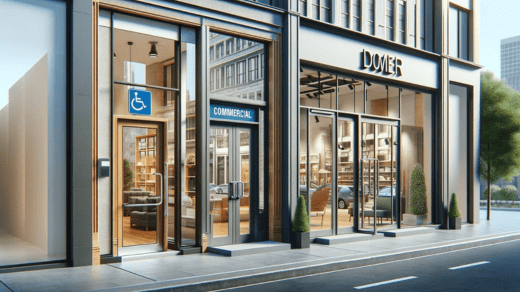In the bustling world of commerce, every detail matters. From the layout of your store to the design of your entrance, each element plays a crucial role in shaping the customer experience. One such essential component is the door – specifically, handicap-capable doors designed to accommodate all individuals, regardless of physical ability.
Understanding Handicap Cap Doors
Handicap-capable doors, also known as ADA-compliant doors, are designed to facilitate easy access for people with disabilities. These doors typically feature wider openings, automatic operation, and tactile indicators for visually impaired individuals. By ensuring inclusivity, businesses can create a welcoming environment for all customers and employees.
Benefits of Handicap Cap Doors
The installation of handicap-capable doors offers numerous advantages to businesses:
Accessibility and Inclusivity
Handicap-capable doors ensure that individuals with disabilities can enter and exit the premises independently, promoting inclusivity and equal access.
Compliance with Regulations
By installing ADA-compliant doors, businesses can avoid legal issues and fines related to accessibility regulations, such as the Americans with Disabilities Act (ADA).
Types of Commercial Doors
Commercial doors come in various styles to suit different needs and preferences:
Swing Doors
Swing doors are a common choice for businesses due to their simplicity and versatility.
Sliding Doors
Sliding doors are ideal for spaces with limited floor area, offering smooth and space-efficient operation.
Revolving Doors
Revolving doors are often used in high-traffic areas, providing efficient traffic flow and energy savings.
Importance of Commercial Glass
Commercial glass doors play a vital role in enhancing the aesthetics and functionality of a business premises:
Enhancing Aesthetics
Glass doors create a modern and inviting atmosphere, attracting customers and enhancing the overall appearance of the establishment.
Providing Natural Light
Glass doors allow natural light to enter the building, reducing the need for artificial lighting and creating a bright and welcoming environment.
The Role of Commercial Storefronts
Commercial storefront serve as the face of the business, influencing customer perceptions and attracting foot traffic:
Attracting Customers
An attractive and well-designed storefront can draw attention and encourage potential customers to enter the premises.
Brand Representation
The storefront design should reflect the brand identity and values, reinforcing brand recognition and credibility.
Choosing the Right Door Supplier
Selecting a reputable and experienced door supplier is essential for ensuring quality products and services:
Reputation and Experience
Look for a supplier with a proven track record and extensive experience in the industry.
Quality of Products and Services
Choose a supplier that offers high-quality doors and provides reliable installation and maintenance services.
Installation and Maintenance
Proper installation and regular maintenance are critical for ensuring the longevity and functionality of Commercial door:
Importance of Professional Installation
Hire experienced professionals to install commercial doors correctly and ensure compliance with safety and accessibility standards.
Regular Maintenance for Longevity
Schedule routine maintenance checks to identify and address any issues promptly, prolonging the lifespan of the doors.
Cost Considerations
When investing in commercial doors, consider the following cost factors:
Initial Investment vs. Long-Term Benefits
While high-quality doors may require a significant initial investment, they offer long-term benefits such as energy savings and durability.
Factors Influencing Costs
Factors such as door material, size, and additional features can impact the overall cost of installation and maintenance.
Future Trends in Commercial Doors
The future of commercial doors is marked by technological advancements and a focus on sustainability:
Advancements in Technology
Emerging technologies such as automatic sensors and smart controls are revolutionizing the functionality of commercial doors.
Sustainability and Energy Efficiency
Businesses are increasingly prioritizing energy-efficient door solutions to reduce environmental impact and operating costs.
Case Studies
Explore real-world examples of businesses that have successfully implemented handicap-capable doors to improve accessibility and customer satisfaction.
Customer Testimonials
Read testimonials from businesses that have benefited from the installation of commercial doors, highlighting the positive impact on their operations and customer experience.
Conclusion
In conclusion, handicap-capable doors play a crucial role in enhancing accessibility, functionality, and aesthetics in commercial settings. By investing in high-quality doors and prioritizing inclusivity, businesses can create a welcoming environment that caters to individuals of all abilities.

